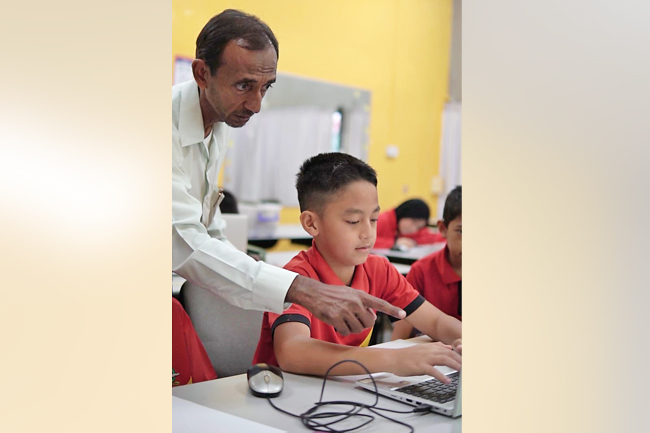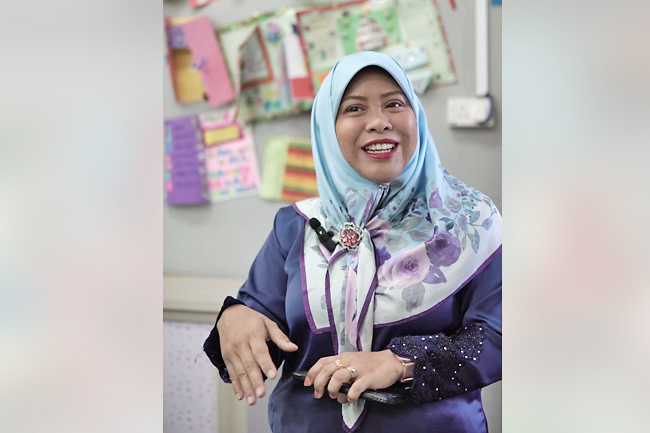Brought to you by

Being assigned to a remote school on an island isn’t your average teaching assignment, but for English teacher Maslinda binti Mohd Tejudin, at Nakhoda Abdul Rashid Primary School in Kampong Menunggol, it felt like fate.
“I began working here as a relief teacher in April 2007,” she shared, “and by August of the same year, I received my appointment letter to continue teaching at this school.
“I felt grateful that I could remain here instead of being assigned elsewhere, Alhamdulillah. There was no awkwardness because I already knew the students, and I was comfortable teaching them.”
Nakhoda Abdul Rashid Primary School is situated on Berambang Island, the largest riverine island in the Sultanate. After a 10-minute boat ride from the capital, an additional 10-minute van ride is needed to reach the school, which serves 41 students with the support of 14 dedicated teachers.
Having spent 17 years at this school, Maslinda has witnessed the remarkable transformation of this rural island community over nearly two decades. She recalled a time when the island had no phone signal, forcing some teachers to rely on SIM cards from a neighbouring country just to maintain communication with the outside world.
“In the past, we had communication problems. Whenever there were calls or messages requesting documents, it was difficult to send them directly due to the lack of signal,” she said.
However, the landscape of communication changed dramatically with the recent installation of a cellular tower near the school.


This development has opened up a world of possibilities, significantly enhancing both the teaching and learning processes. Now, students are not only able to engage with educational content more effectively but are also being prepared to navigate a technology-driven future.
This, however, would not have been possible without the support of the Ministry of Education, which has supplied the school with tablets and laptops.
As one of the oldest schools in Brunei – established in 1961 and officially named in 1981 – the facilities are quite impressive, including a well-equipped ICT room.
“In class, using the projector helps reduce the time spent writing on the whiteboard. Teachers come prepared with PowerPoint presentations and other resources, making the process more efficient.
“With the time saved on material preparation, there’s more opportunity for engaging in other activities,” Maslinda explained.
Moreover, the senior educator emphasised that the small student body enhances the learning experience, enabling teachers to engage in meaningful one-on-one interactions.
This approach allows them to identify each student’s strengths and tailor their teaching methods accordingly.
At Nakhoda Abdul Rashid Primary School, this commitment to engagement forms the cornerstone of education. In a community where communal spaces are limited to a small sundry shop and mosque, the school plays a pivotal role as a community hub.
As such, teachers continually strive to keep students engaged through a variety of initiatives and activities.
This holistic approach not only promotes academic development but also nurtures personal growth, fostering a strong bond between students and teachers.
With most students having family members working off the island, they spend the majority of their day – from morning until the afternoon – at school.
“While students in urban areas typically go home for lunch with their families, our students are provided meals through the ministry’s ‘Program Harapan’,” Maslinda said. On Saturdays, designated as extra-curricular activity (ECA) days, students engage in a range of activities under the ministry’s ‘Program Sahsiah Pelajar’.
These include walks to neighbouring villages, which promote health and community spirit. Often, these outings transform into cleaning campaigns, with students armed with plastic bags, encouraged to collect litter along the way.
At the end of the day, it is this community spirit that drives both teachers and students to better themselves. At Nakhoda Abdul Rashid Primary School, teachers are not merely educators; they are integral members of the community.
“Most of the people here are from the same village, and many are relatives, so the bond is strong. There’s a lot of support between students and parents.
“For instance, if a student is absent, it’s easy to understand the reason. It’s unusual for them not to attend since they are usually here daily, and they often confide in us about their concerns.”
Ultimately, Maslinda feels happy and grateful to teach at her school. Although she acknowledged certain challenges, including the commute by boat from the capital followed by another van ride, she asserted, “It has become our responsibility to go through all that to reach the school and teach.”
In conjunction with Brunei’s 34th Teacher’s Day, Maslinda extended her greetings to all teachers in the Sultanate.
“I hope teachers out there will continue the fight and enthusiasm in teaching the students, and I hope the students will keep striving,” she said, her voice filled with emotion as she held back tears.




